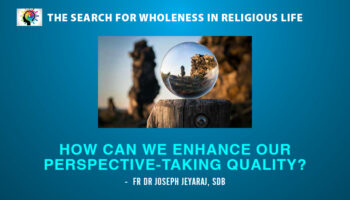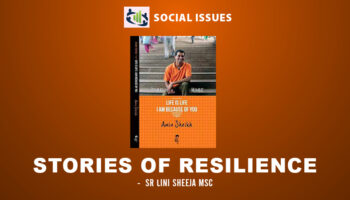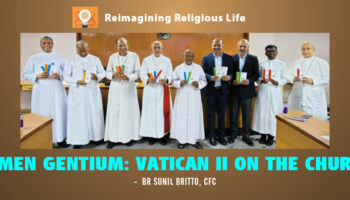Thriving Despite Adversity
Mr. Rajan’s story in the previous column was not just about hope; it was also about resilience – the capacity to thrive despite adversity, to bounce back from setbacks, from trauma and tragedy and being able to live at even greater levels of wellbeing and satisfaction than before, that is, to flourish.
Resilient people, like the proverbial phoenix, are able to rise up literally from the ashes of their destructive or painful experience and thrive again.
The remarkable restoration and growth of the city of San Francisco after the 1906 earthquake and the resulting fires which gutted almost the entire city, and the ability of Hiroshima and Nagasaki to rise again from the ashes of nuclear devastation are classic examples of resilience.
So also is the remarkable story of Steve Jobs, an icon in the IT industry. Co-founder of Apple, he was the creative genius behind the iMac, the iPod, the iPhone, and the iPad. But many may not know that he was dismissed from the company which he had founded. The experience did not break him, rather it forced him to reinvent himself. He would later say that this was the best thing that happened to him. It forced him to start again from scratch and invent new things.
Soon after, Steve Jobs was diagnosed with pancreatic cancer, which doctors thought inoperable. Against such odds, the man went on to become one of the world’s most admired creative geniuses, exceeding existing benchmarks of performance by miles.
Steve Jobs did not allow setbacks to dishearten him, rather he used them as stepping stones to climb greater heights. He was resilient.[1]
RESILIENCE IS NOT JUST RECOVERY
Resilience is not just about rising from the ashes. It is also about the capacity to maintain high levels of resistance to stressful events. According to psychologist Bonanno, an expert in the study of resilience, it enables us to endure upheavals remarkably well, with no apparent disruption in our ability to function and to move on to new challenges with apparent ease.
According to Bonanno, in contrast to recovery, which connotes a breakdown in normal functioning following trauma or loss, leading to high levels of distress or even psychopathology and then gradually returning to pre-event levels, resilience reflects the ability to maintain a stable equilibrium in the face of adversity.
When we are resilient, even when we experience a potentially highly disruptive event, we are able to maintain relatively stable, healthy levels of psychological and physical functioning. We show resilience through our capacity to respond flexibly and adaptively to adverse situations.
As resilient persons we are not broken by suffering; rather, we experience difficulties and obstacles as opportunities to grow. We not only bounce back from setbacks, we also grow and develop through these experiences just as Steve Jobs and many great artists, were able to do.
CONTRIBUTORS TO RESILIENCE
What leads to resilience?
Psychologists have identified certain areas of competence that lay the foundation for resilience. These are some of the contributors to health and happiness described in previous columns. Among these are: secure attachments; interpersonal competence, including the ability to recruit help; cognitive competence to plan; emotional competencies, especially the capacity to regulate emotions, delay gratification, and maintain high levels of hope, optimism and self-esteem; grateful living, and having meaning and purpose in life.
According to some psychologists, having meaning and purpose in life is the core competency that contributes to resilience. As Nietzsche is said to have observed, “If you have a WHY to live for, you can live any HOW.” That is, if we have a meaningful purpose in life, we can face and triumph over any adversity.
Viktor Frankl used Nietzsche’s words as inspiration to survive the horrors of the Auschwitz concentration camp. He kept constantly before him a reason to get out of the camp alive—to re-join with his wife. As a result, he alone of his batch of inmates survived to tell his story and become a celebrity after the war, while all the others perished in the camp.
A strong sense of purpose helps us face adverse circumstances more positively. According to psychologists McKnight and Kashdan, purpose in life facilitates “psychological flexibility”; serves “as the motivating force to overcome obstacles”; “leads to more productive cognitive, behavioural, and physiological activity” and “lower stress levels and greater satisfaction with life.”
Faith and attendance at religious services have been found to foster resilience. The world views provided by faith contribute to purposefulness and meaningfulness, offer support in difficult times, and the strength to triumph over adversity.
As Emmons, a psychologist who researches the impact of religion and spirituality on wellbeing, has observed, “Religion and spirituality can provide a unifying philosophy of life and serve as an integrating and stabilising force in the face of constant environmental and cultural pressures that push for fragmentation, particularly in post-modern cultures.”
MENTORS AND ROLE MODELS
Every research that has explored the variables that have contributed to resilience, especially to flourishing after a dysfunctional childhood, has found one common variable that has led to positive outcome. This was the presence of an empathic other, usually a loving aunt or uncle or a dedicated and sensitive teacher, who became a mentor and a role model and whose care and support made up for deficiencies and enabled the individual to find meaning and purpose in life and triumph over tragedy.
One sensitive and caring individual can make a profound difference in the life of another, no matter how dismal or dysfunctional his or her life experiences might have been. Each of us can become that empathic other and transform lives.
Resilience literature shows that many of the characteristics of emotionally healthy persons, some of which we have considered in previous columns, are subsumed under resilience. Resilience can thus be considered a master contributor to health and happiness.
For reflection
- How resilient are you?
- How do you generally handle adversities?
- Have you been able to thrive after some tragedy? If yes, what helped you?
- What is the level of meaningfulness you experience in your life? How can you enhance meaningfulness in life?
- Can you recall an empathic other who has touched your life profoundly?
————————————————————————————————————————————————————-
[1] You can read Steve Job’s Commencement Speech at Stanford University in which he shared stories of adversity and resilience at : http://news-service.stanford.edu/news/2005/june15/jobs-061505.html

To subscribe to the magazine Contact Us





